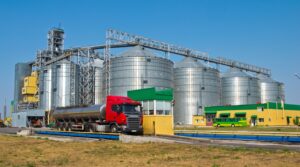
“Kernel, one of Ukraine’s largest agro-industrial groups, in the third quarter of fiscal year 2023 (FY, January-March 2023), earned $69 million in net profit, while it ended the same period last year with a net loss of $103 million.
According to a financial report on the company’s Web site, the agriholding’s revenue fell 51 percent to $825 million in the reporting period.
EBITDA for the third quarter of 2023FY was $155 million, compared to a negative $32 million in 2022FY.
Compared to the previous quarter, net income decreased by 67%, EBITDA – by 44%, and revenue – by 33%, Kernel said.
Agroholding attributed this decrease to a decrease in both volumes and prices.
The company added that the net change in fair value of biological assets resulted in a loss of $11 million in January-March 2023, compared to a loss of $74 million in the same period the previous year.
“Kernel also recognized a $20 million asset impairment loss in the third quarter of fiscal 2023.
It is specified that in the structure of EBITDA the segment of infrastructure and trade in the third quarter of FY 2023 decreased by 32% year-on-year to $71 million, but was higher by 15% quarter-on-quarter, which was facilitated by a high trade markup on grain of Ukrainian origin.
Due to a decrease in world prices for grains and oilseeds in January-March 2023, the agriculture segment posted a $24 million loss in the reporting period.
According to the report, Kernel managed to reduce its net debt to $833 million as of March 31 this year from $1.048 billion at the beginning of the year and $1.715 billion at the end of March last year.
At the same time, agricultural stocks decreased to $497 million from $593 million and $1.181 billion, respectively.
Overall, Kernel increased its net profit by 36% YoY to $437 mln and EBITDA by 11% while revenues decreased by 45% to $2.715 bln in 9M2003.
As reported, Kernel ended FY2022 with a net loss of $41 million compared to $506 million in net income in the previous fiscal year on revenue down 5% to $5.332 billion.
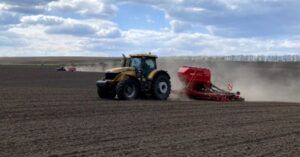
Kernel Agro-Industrial Group, as of mid-May, has fulfilled 95% of its plans to sow spring crops, allocating 35% of the area for sunflower and 18% for soybeans, the company said on Facebook.
“Agroclimatic features of the current season: a large amount of precipitation in March and April, a high level of subsurface water in some regions and, accordingly, the waterlogging of much of the fields – have significantly adjusted the production program of agricultural enterprises “Kernel”,” the company said in its information.
As reported, the sunflower accounts for 35% of sown area, or 120 thousand hectares, the corn – 24%, or 85 thousand hectares, the soybean – 18%, or 65 thousand hectares.
Moreover, winter wheat accounts for 17%, or 60.4 thousand hectares in the structure of areas under crops. Areas under rape and perennial grasses are traditionally insignificant, the holding said.
It is stated that Kharkiv cluster was able to carry out seeding on 28 thousand hectares, and another 1 thousand hectares were left without treatment because of security reasons, as these lands are located 40 km from the front line – in Kupiansky area. As of May 16, 100% of the planned areas for the season were sown in the cluster.
According to Alexander Zvyagintsev, deputy head of production of the Kharkiv cluster, 35% of the area is planted to winter wheat, 30% to sunflower, 15% to winter rape, 10% to corn, and 10% to soybeans.
Druzhba Nova” cluster team in Sumy region took 177 thousand hectares of arable land for the future harvest, while 7 thousand hectares near the Russian border were left uncultivated.
Druzhba Nova” cluster head for production, Igor Tihonchuk, said that corn and sunflower are already being sown; 20% and 35% of the crop is under crop cultivation correspondingly. Sowing of soybeans, which will take 24% of the area, will be completed by May 25. Sowing of winter wheat will occupy 17% of the area.
According to the holding, because of the oversaturated fields, some early spring technological operations have been canceled, replaced or shifted in time. The shift in timing affected the beginning of the sowing season, which in all regions began in late April, which is two weeks later than the traditional dates.
Kernel Agronomic reported favorable sowing conditions for sunflower and corn, which were sown in parallel to accelerate the pace of the sowing season.
“Most agroclusters have completed corn and sunflower seeding and are completing soybean seeding. This is a heat-loving crop, the conditions for sowing which were not favorable until May 5-6. Despite the vagaries of weather, 80% of areas for the next soybean crop we plan to sow at the optimum time for the crop, “- summed up the agricultural holding.
“Kernel” before the war was the world’s number one producer of sunflower oil (about 7% of world production) and its export (about 12%), as well as the biggest producer and seller of bottled sunflower oil in Ukraine. The company was also engaged in cultivation of other agricultural products and their sale.
In FY2022 (July-2021 – June-2022), the holding posted a net loss of $41 mln versus $506 mln net profit in the previous FY, while its revenue decreased by 5% to $5.332 bln and EBITDA decreased by 3.7 times to $220 mln.
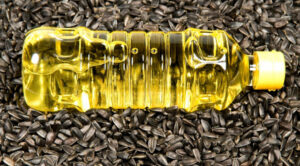
Kernel Agro Holding, one of the largest in Ukraine, processed 744 thousand tons of sunflower seeds in the third quarter of FY2023 (January-March), an increase of 32% compared to the same period last FY, operating six oilseeds processing plants.
“Vegetable oil sales in Q3 FY2023 increased only 1% from the same period last year to 273,000 tons, including 20,000 tons of bottled sunflower oil,” the company said on the Warsaw Stock Exchange.
According to it, two oil extraction plants belonging to the group remain inaccessible in the high-risk zone of Kharkiv region with regular shelling by Russian occupiers.
“The group managed to increase the utilization of its plants in January-March 2023 compared to the previous quarter, given the stabilization of electricity supplies in Ukraine and the expansion of the grain corridor,” Kernel pointed out.
Overall, in the first nine months of FY 2023 sunflower processing volume decreased by 8% – to 1 million 858.08 million tons, and oil sales – by 10%, to 819.96 thousand tons.
According to Kernel, due to the postponed 2022 harvest campaign, which was postponed until the winter of 2022/2023, elevator loading in the third quarter of FY 2023 reached an unusually high level of 687,000 tons. However, volumes for the first nine months of the season were down 34% from the same period last year to 2.7 million tons, reflecting a lower 2022 crop compared to the 2021 season.
It is pointed out that the volume of transshipment of export terminals in Ukraine in Q3 FY2023 almost halved compared to the same period last year to 1.1 million tons of grain, sunflower oil and meal, compared to 1.7 million tons of transshipment in the previous quarter.
“The Group’s export volumes are highly dependent on the operation of the “grain corridor” in the Black Sea. Although the grain corridor deal was extended in March 2023, it remains unclear for how long. “Moreover, in the last few days, ship inspections were completely stopped as the Russians refused to perform their duties to interrupt the initiative,” Kernel noted.
The company added that, in addition, stiff competition between Ukrainian terminals for quotas for agricultural exports through the “grain corridor” and the existing quota distribution mechanism are unfavorable for market leaders like Kernel, as historically smaller operators handling relatively smaller volumes have received disproportionately high quotas, making it impossible to maximize exported products.
“Recent import and transit restrictions imposed by neighboring EU countries further reduce agricultural exports from Ukraine,” the company pointed out, specifying that since the launch of the “grain initiative,” 87% of its export volumes have been shipped to foreign markets through Black Sea ports, 6% through Danube ports and 7% through domestic routes.
Continued difficulties with grain logistics in the Black Sea region led to a 61% year-over-year decline in grain exports from Ukraine in Q3 FY2023 to 0.8 million tons, Kernel added.
“To maximize operational efficiency, the Group gives preference to sunflower oil and meal ships rather than bulk grain ships (given the more attractive margins in the Group’s oilseed processing business), although this approach reduces grain export volumes, as logistics capabilities remain a key bottleneck,” the statement said.
According to him, the volume of transshipment of export terminals in Ukraine decreased by 52% to 3 million 504.59 thousand tons and grain exports – by 61% to 3 million 77.7 thousand tons in 9 months of FY2023.
“Kernel” also reported that at the time of the report and since the beginning of a full-scale invasion of Ukraine by the aggressor, 1405 employees of the Group were mobilized in the Armed Forces of Ukraine or joined the territorial defense units. Of these, 558 were demobilized and returned to work, 22 employees were killed, and more than 70 employees were wounded.
“Before the war Kernel was the world’s number one producer and exporter of sunflower oil (about 7% of world production) and the largest producer and marketer of bottled sunflower oil in Ukraine. The company was also engaged in cultivation of other agricultural products and their sale.
In FY2022 (July-2021 – June-2022), the holding posted a net loss of $41 mln versus $506 mln net profit in the previous FY, while its revenue decreased by 5% to $5.332 bln and EBITDA decreased by 3.7 times to $220 mln.
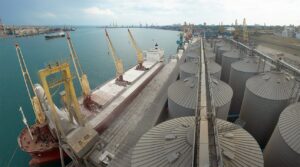
Kernel, one of Ukraine’s largest agricultural holdings, bought the Danube Prom Agro river terminal in the Ukrainian port of Reni on the Danube in February 2023, according to the company’s semi-annual report.
“The terminal has flat warehouses with a single storage capacity of 12,000 tons, and the acquisition is part of the company’s strategy to provide backup options in case Black Sea ports become unavailable as a result of the March 2023 grain deal being terminated,” the agri-holding said.
It noted that it intends to continue investing in its operations in the port of Reni to expand transshipment capacity, and such investments will be attracted by the USAID Sustainable Agriculture Initiative, which has agreed to purchase and supply the equipment needed for such expansion.
In addition, Kernel announced that on March 3, 2023, it closed the sale of a number of farms with a 134,000-hectare land bank, as well as related agricultural infrastructure, equipment and working capital, to companies associated with Kernel’s largest shareholder and board chairman, Andriy Verevsky, as announced in April 2022. This was preceded in February by the final approval of creditors to complete the transaction.
Oleg Vlasenko was the beneficiary of Danube Prom Agro, according to information in the state register. The company’s revenues in 2020 were 1.86 million hryvnia, and its assets at the end of the year were 4.73 million hryvnia.
In April 2022, Kernel’s board of directors decided to divest some of its 134 thsd ha crop farms and sell the assets to Verevskyy companies for $210 mln. The company announced that it wanted to reduce business risks and improve medium-term liquidity amid Russia’s military invasion of Ukraine.
As reported, in the first half of FY 2023 (July-December 2022), Kernel decreased its net profit by 12.6% YoY to $370.31 million, while revenues fell by 41.3% to $1 billion 889.78 million.
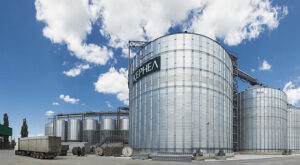
“Kernel, one of Ukraine’s largest agribusiness groups, earned $208.71 million in net income in the second quarter of fiscal year 2023 (FY, July-September 2022), down just 2.1% from the same period in the previous FY.
According to a financial report on the company’s Web site Friday evening, the agriholding’s revenue for the period fell 34.2 percent to $1 billion 235.28 million.
Gross profit was down 14.9 percent to $294.06 million, operating income was down 2.3 percent to $244.36 million and EBITDA was down 5.1 percent to $277.15 million.
These numbers are significantly better than the first quarter of this fiscal year.
The company attributed the 34% year-on-year decline in revenues to lower exports of grain, sunflower oil and meal.
The report notes that the net change in fair value of biological assets did not have a significant impact on the group’s results in the second quarter, with a profit of $0.3 million versus a profit of $27 million in the same period last year.
According to the document, shipping and handling costs accounted for 23% of cost of sales in October-December 2022, up 120% quarter-on-quarter and 64% quarter-on-quarter, reflecting sharply higher logistics costs in exporting goods from Ukraine. This caused a 15% decrease in gross profit.
“Kernel also recognized a $5 million gain from the reversal of previously recognized asset impairments, primarily related to inventories located in territories previously occupied by Russia, as the company was able to access and use such inventories in its operations.
General and administrative expenses in the second quarter of fiscal 2023 were $59 million, an increase of 33% over the first quarter of fiscal 2023, reflecting higher payroll-related accruals.
Regarding EBITDA, Kernel clarified that in the Oilseeds Processing segment, it increased 10% year-over-year to $66 million, mainly due to the second consecutive quarter of strong profitability for those players who were able to organize the logistics of sunflower oil exports from Ukraine.
“Despite improved profitability year-over-year in the reporting period for all businesses in the Infrastructure & Trading segment, a more than two-fold decline in export volumes led to a 46% year-over-year decline in segment EBITDA to $62 million,” the report said.
According to it, the Agriculture segment recorded a solid EBITDA of $204 million, up 45% from last year. This growth is largely due to the devaluation of the hryvnia, the document said.
Kernel added that its net profit from exchange rate differences in the reporting period amounted to $8 mln.
Kernel’s net debt, according to the report, decreased during the quarter by 30% – to $1.048 billion, and the ratio of net debt to EBITDA decreased from 13.5 to 11, but it is still much higher than a year ago, which was 1.9.
Overall, in the first half of 2023FG Kernel’s net profit decreased by 12.6% to $370.31 million compared to the same period last year, while revenues fell by 41.3% to $1 billion 889.78 million.
Gross profit was down 30.8% to $467.41 million, operating income was down 21.8% to $386.83 million and EBITDA was down 21.9% to $445.52 million.
As reported, Kernel ended FY 2022 with a net loss of $41 million versus $506 million in net income in the previous fiscal year on a 5% decline in revenue to $5.332 billion.
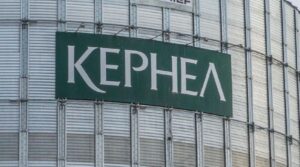
Kernel Ukrainian Agro-Industrial Group received an award from the UN Global Compact in Ukraine for its contribution to the creation of an anti-corruption video course. The course explains the principles of transparent business conduct and anti-corruption practices for small and medium enterprises.
According to the holding’s Facebook page, it joined the circle of organizations that worked on the development of the UN Global Compact’s Anti-Corruption program in Ukraine.
It is specified that the video course consists of five training modules lasting 5-8 minutes each, which reveal the principles of transparent business conduct and anti-corruption practices in Ukraine. You can watch the educational series on the portal “Diya.Biznes” and the platform “Diya.Digital Education”.
The course is designed to deepen entrepreneurs’ knowledge of anti-corruption processes to keep the country’s economy healthy.
“Kernel” before the war was the world’s number one producer of sunflower oil (about 7% of world production) and its exports (about 12%), and was the largest producer and seller of bottled sunflower oil in Ukraine. In addition, the company was involved in other agricultural products cultivation and sales.
The largest co-owner of Kernel, through Namsen Ltd. is Ukrainian businessman Andrei Verevskyi, with a 39.3% stake.
In FY2022 (July-2021 – June-2022), the holding posted net loss of $41 mln against $506 mln net profit in the previous FY. Its revenue decreased by 5% – to $5.332 bln, while EBITDA decreased 3.7 times – to $220 mln.